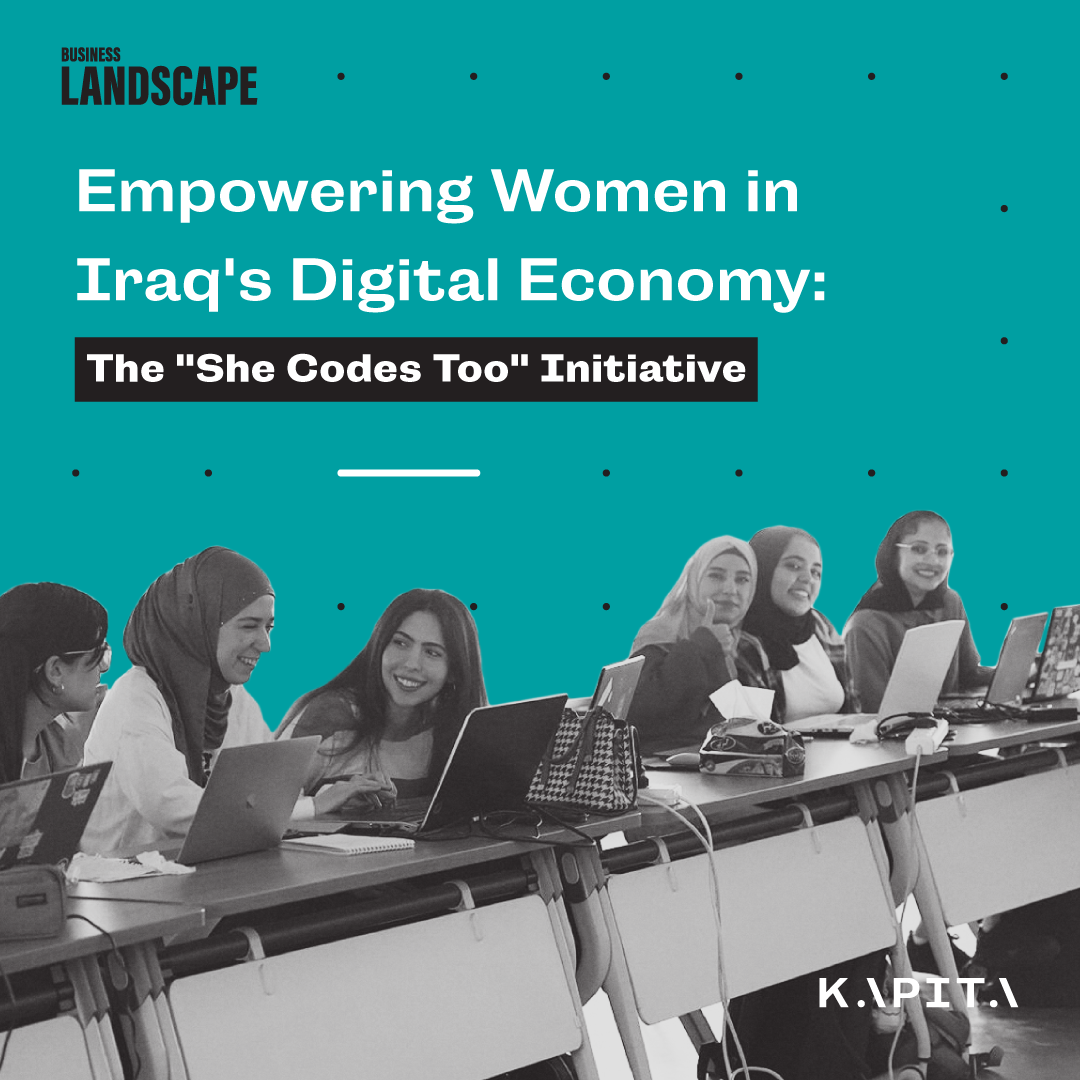Fueling the Iraqi Entrepreneurial Scene: Insights from KAPITA’s Programs
Mohammed Hameed, Programs Manager
Safwa Salim, Senior Research Associate
Essam Munir, Research Associate
KAPITA Business Hub
The Iraqi entrepreneurial scene has been constantly evolving in the last decade. The spark that started this ecosystem has been ignited by multiple digital hackathons, boot camps, short-term training, volunteering initiatives, and many others, mostly led by youth and supporting organizations. This has collectively generated more awareness of entrepreneurship and has encouraged more startups to develop their business ideas and strengthen the foundation of their businesses by applying to pre-incubation and preparatory programs, which nourished their ideas, validated them, and shaped the entrepreneurial mindset.
Building upon the existing scene, in order to fuel the Iraqi entrepreneurial scene with well-equipped entrepreneurs to navigate its challenges and capitalize on its potential, KAPITA has developed different programs and initiatives that cater to the needs of businesses in all different stages, from ideation to growth to develop the entrepreneurship ecosystem and the private sector.
KAPITA’s Innovation Pipeline
An innovation pipeline is essentially a systematic approach or a framework a company uses for innovation, a process to build up something new in the market. The implementation of each of KAPITA’s programs serves as an innovation pipeline within the Iraqi business landscape. Each program is designed and structured to empower various business stages, starting with business ideas, early-stage startups, and finally, existing businesses. These pipelines help to achieve two outcomes. The first outcome is reforming the way the Iraqi ecosystem is evolving toward modern methodologies of business creation. The second outcome relates to the quality of entrepreneurial skills available. The pool of entrepreneurs in the Iraqi market periodically grows as the number of programs’ graduates increases, professional and capable individuals eager to change and grow.
KAPITA’s programs are designed to cover every stage of development. This includes access to knowledge, finance, mentorship, and practical support, a holistic approach to ensure that entrepreneurs receive the necessary support and thrive at every step of their journey. Aiming to achieve this goal, KAPITA has implemented five different programs.
Orange Corners Baghdad is an incubation program implemented by KAPITA and powered by the Kingdom of the Netherlands Embassy. The program targets early-stage startups and offers training sessions on start-up planning, resource management, marketing and communication, and research skills, as well as business development training on risk assessment, marketing development skills, and current market needs. The startups are equipped with essential skills, tools, and know-how to support their entry and expansion into the Iraqi market. The program provided a nurturing environment that enabled these young entrepreneurs to refine their business ideas, develop robust business plans, and gain insights into the competitive market landscape. The program also extends to networking opportunities, professional consultations, and potential funding, all with the goal of establishing successful ventures. Six cohorts have successfully graduated, each comprising 20 startups, resulting in a total of 120 businesses completing the intensive six-month incubation program.
The Orange Corners Innovation Fund (OCIF) is implemented by KAPITA in partnership with the Ministry of Foreign Affairs of the Kingdom of the Netherlands and the National Bank of Iraq. OCIF stimulates innovation and improves early-stage startups’ access to finance across Iraq. The fund's combination of grants, investments, and investment readiness training helps take promising businesses to the next level and penetrate the market effectively.
The OCIF program has proven to be a transformative initiative in providing access to finance for startups that have graduated from the Orange Corners Incubation Program. From June 2022 to June 2023, KAPITA successfully funded 12 startups through the OCIF program, reaffirming its commitment to supporting the growth of the private sector in Iraq. Startups receiving funds from this program are diverse and specialize in e-commerce, agribusiness, electricity, and mobile applications, to name a few. The winning startups include Al-Rafeel, Orderii, Harir, Holiveg, KABINA, Cotton, Tanweer, Step, Kawenter, and Geomatica.
In addition, the ScaleUp Academy Acceleration Program is a an accelerator enabled and funded by the Deutsche Gesellschaft für Internationale Zusammenarbeit (GIZ) GmbH and Asiacell.
It targets existing businesses and is designed to enable entrepreneurs to scale their businesses effectively and efficiently by providing practical training and mentorship. 4 cohorts have been successfully completed with the graduation of 40 startups.
ScaleUp Academy also offers the opportunity for startups to pitch in front of the Iraqi Angel Investors Network. This exposure provides the startups with a chance to secure potential funding and forge vital connections. In addition to practical support in the form of services and a voucher of $5,000 each to aid the startups in their business development journey.
Recognizing the potential of small and micro businesses, KAPITA’s Takaat Initiative, in collaboration with General Electric (GE), provides essential support to 50 enterprises facing challenges or struggling to grow in the market. During the program, industry experts work closely with businesses to identify tailor-made solutions to meet their unique needs. The practical assistance provided by Takaat has already made a significant impact on production, marketing, and sales, propelling these MSMEs toward success.
Striving to promote the equal participation of women in the Iraqi entrepreneurial scene, the We-Fi Initiative, in collaboration with the WorldBank Group, implemented by KAPITA and 51Invest focuses on supporting women-led businesses. The program offers financial literacy training through a three-day boot camp conducted in key cities like Baghdad and Mosul. We-Fi opens doors for accessing small and large grants, such as those provided by initiatives like CARP-GIZ.
The Increased Entrepreneurial Drive Among the Youth
In a period of almost four years, KAPITA’s pipeline of programs has witnessed significant growth in the number of applications received through both the Orange Corners Incubation Program and the ScaleUp Academy Accelerator. In the first cohort of OC in 2019, we received 245 applicants; this number more than doubled in the last cohort in 2023 to reach 576. In total, the incubator and accelerator applications have reached around 3000 applicants.
Despite having several entrepreneurs who have undertaken multiple development programs, the applications show a notable reach to other potential beneficiaries, people who have not heard of nor joined any development program and yet exhibited a notable potential for growth in their businesses. The acquired data also shows that during COVID-19, in the early phases of the pandemic, startups have faced a lot of challenges in improving their business status, promoting their products, and expanding to new areas. Despite these hurdles, this has not affected the number of applications significantly. We kept receiving many applications as time passed and the pandemic started diminishing.
It is also noted that the entrepreneurial drive is mostly demonstrated amongst the youth, as most of the applications were received by the youth segment from 20 to 35 years old, with around 37% of them being between the ages of 25 and 30.
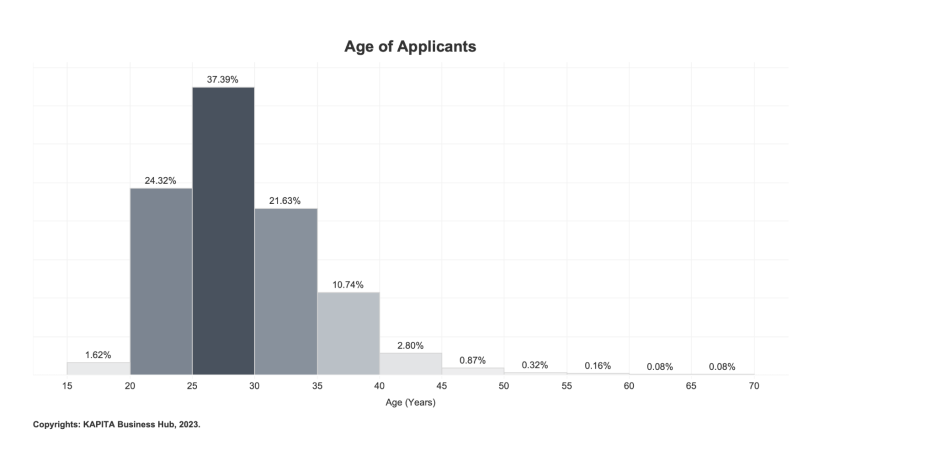
The drive is also found mostly among college graduates, as they constituted 50% of the applications, demonstrating that there could be a shift in the mindset in some of the college students today, even if a slight compared to the numbers of college graduates every year, and the youth have started navigating paths other than the public sector employment.
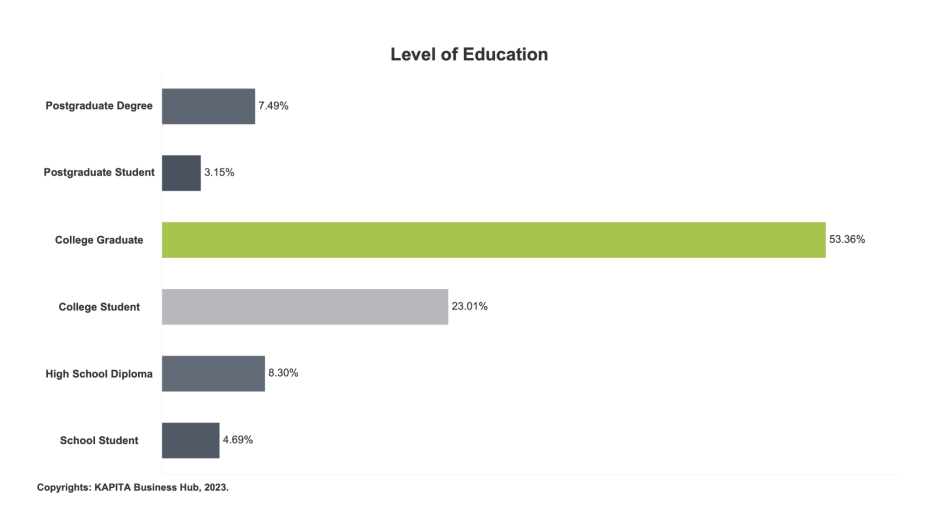
The Trends of Startups’ Stages and Sectors
Throughout the seven cohorts of the OC incubation program, the majority of the applicants’ startups were in the ideation phase; the percentage almost stayed consistent at around 40%, falling slightly below that in the last two cohorts. Whereas for ScaleUP Academy, which targets existing businesses, the same percentage of applicants remained consistent throughout the years; around 40% were generating revenues.
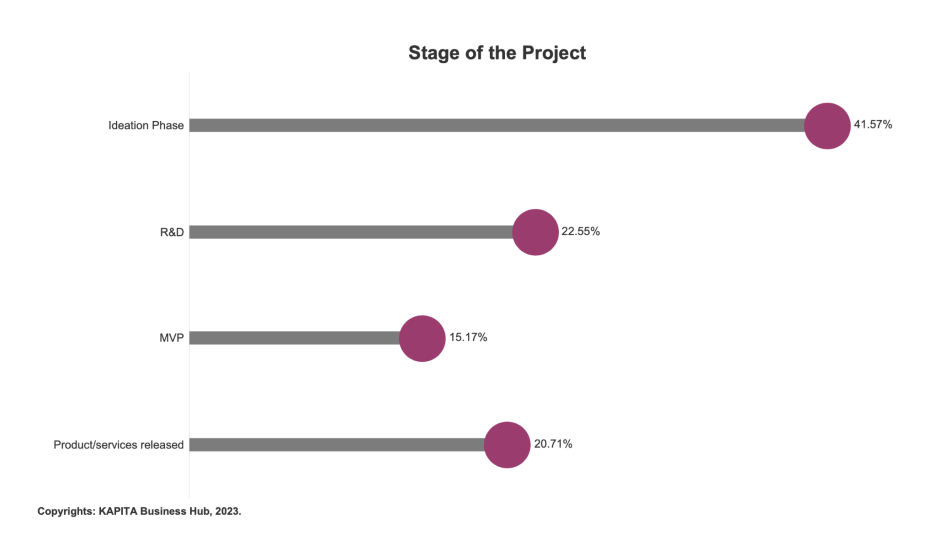
The main sectors of the total businesses applied to the incubation program were mostly technology-oriented or in the e-commerce sector, with around 20% each, followed by product-based businesses and then agriculture, among others.
Yet, the interest in the agriculture sector has been significantly increasing over the years, with almost 50% of applications received for OC from businesses operating in this field. A similar trend is also observed in product-based businesses.
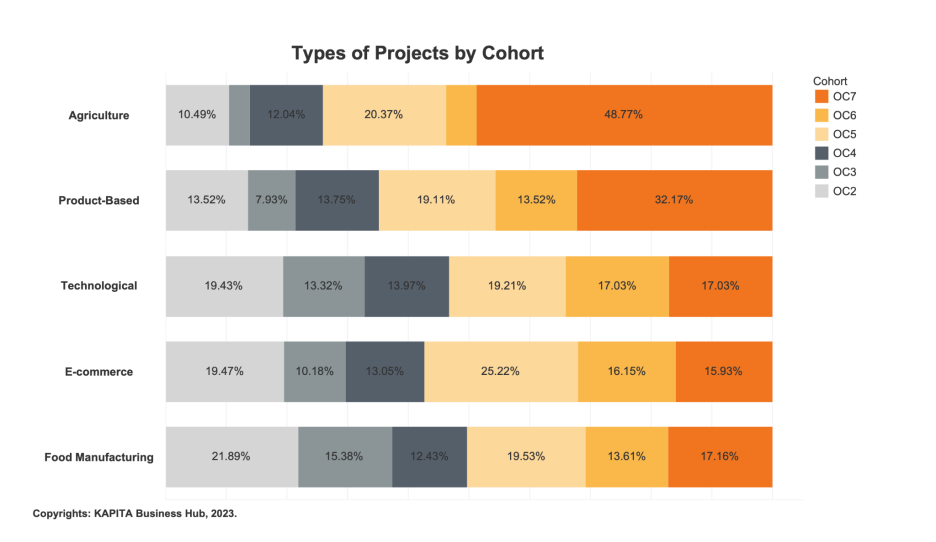
Bridging the Gender Gap
The participation of women in the Iraqi ecosystem remains significantly less than that of men. We can see that in different aspects, from the lack of women-founded businesses, women entrepreneurs, investors, and mentors compared to that of men. This has been reflected in the number of received applicants for KAPITA’s programs. However, through various cohorts of Orange Corners Baghdad, we saw that there is a notable increase in the number of women-founded businesses. The percentage of women applicants to the last OC cohort has doubled compared to the first cohort. The increased awareness of the entrepreneurial support programs and targeted campaigns have propelled more women to apply to the incubator program.
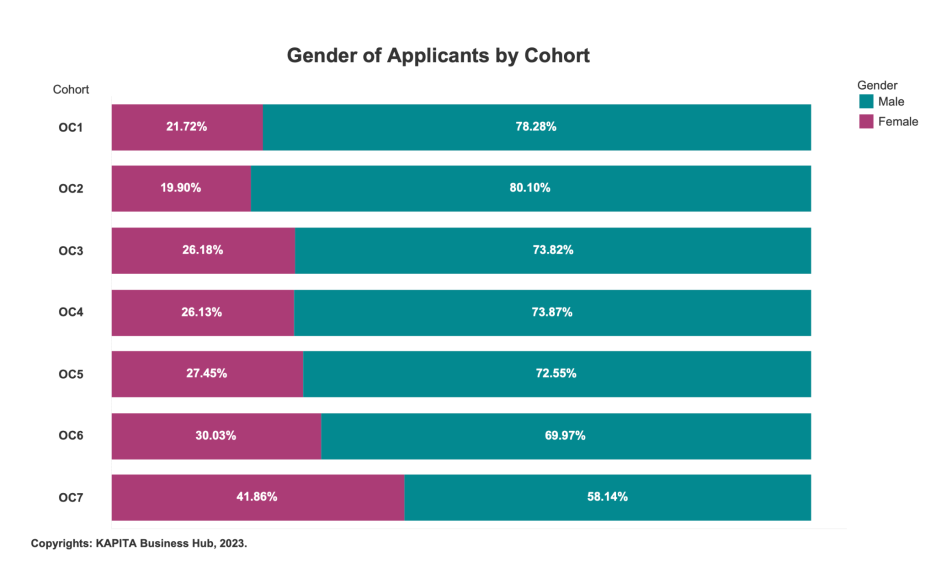
ScaleUp Academy applications maintained almost a constant increase of women applicants by no more than approximately 5% per cohort in ScaleUp Academy Accelerator applications. This is due to the reason that Orange Corners targets businesses in their early stages while ScaleUp Academy focuses more on innovative businesses in their advanced levels, and this leads us to the conclusion that there are fewer women-founded businesses that are considered advanced and are ready to undergo an acceleration program. However, KAPITA’s mission to strengthen the pipeline of startups and focus on women-founded businesses has led to the launch of initiatives such as the We-Fi Iraq initiative, which focused on supporting women-led businesses.
It is also worth noting that the majority of women-founded businesses remain in certain sectors, such as handmade, retail, and services sectors, categorized by less growth potential, and in many cases, the entrepreneurship drive within women entrepreneurs is necessity-based, while tech-oriented sectors remain male-dominated.
Access to Finance
Access to finance is one of the main challenges that entrepreneurs are facing within the Iraqi ecosystem. The maturity level of the existing startups is not creating a significant demand to increase the supply of funding, whereas the lack of access to finance is also hindering the growth potential of many startups. Currently, initiatives such as the CARP project by the GIZ, EDF-i initiative by IOM, and other programs are still in their early stages to yield any outcomes of the disbursement of multiple grants and loans to the startups and SMEs. KAPITA’s mission, on the other hand, aims to provide access to finance, which has been enabled through initiatives like the foundation of the first Iraqi Angel Investors Network and Orange Corners Innovation Fund. In a period of less than 3 years, KAPITA has had its share of successful investment deals by foreseeing the success of 7 investment deals through the Angel Investors Network out of a total of approximately 15 investment deals across Iraq. The Orange Corners Innovation Fund, in a period of one year, has awarded 12 businesses that completed the Orange Corners incubation program a combined sum of 27,500 Euros per startup. This financial support will help these businesses grow, boost their presence in the market, enhance their workforce, and expand their product lines by integrating and improving existing products.
Building the Entrepreneurial Ecosystem for a Sustainable Economy
KAPITA’s mission to support and empower youth is still ongoing by encouraging the foundation of solid businesses that support the development of the Iraqi economy. Challenges are still being faced in finding businesses that address fintech solutions, agritech, and water resources management. This dedication to finding and supporting such businesses is especially crucial in addressing some of Iraq's pressing challenges, such as climate change.
Over the long term, KAPITA strives to fill critical gaps in these sectors. By supporting and facilitating the emergence of businesses in fintech, KAPITA is fostering financial innovation, improving access to modern financial services, and promoting economic inclusivity. In the agritech sphere, we are trying to enhance agricultural practices, boost food production, and ultimately ensure food security for Iraq. Additionally, our focus on water resources management is pivotal in tackling one of Iraq's most pressing concerns, as it helps optimize the sustainable use of this invaluable resource, mitigating water-related challenges and fostering environmental sustainability. We are still working to lay the foundation for a more robust and diverse private sector in Iraq.
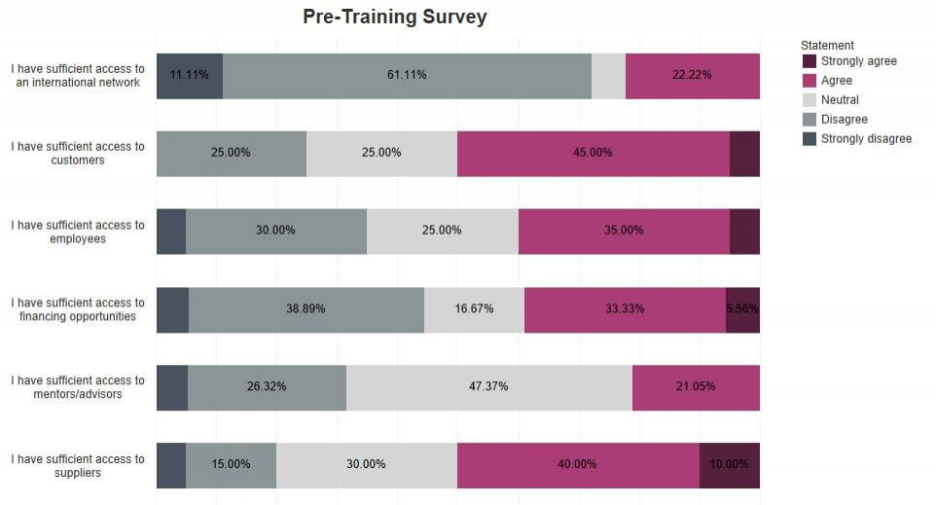
Through implementing long-term programs and small initiatives, KAPITA hopes to shift the youth mindset from a public-sector-driven to a private sector. With our continuous support, we believe that even the businesses that fail to succeed after graduation from these programs have altered the mindset of the business founder. By undergoing such training, facing challenges in the Iraqi market, and developing their business leadership skills, those entrepreneurs will certainly be more able to drive their current or future businesses to success by relying on the lessons learned and the information acquired through these developmental programs.

